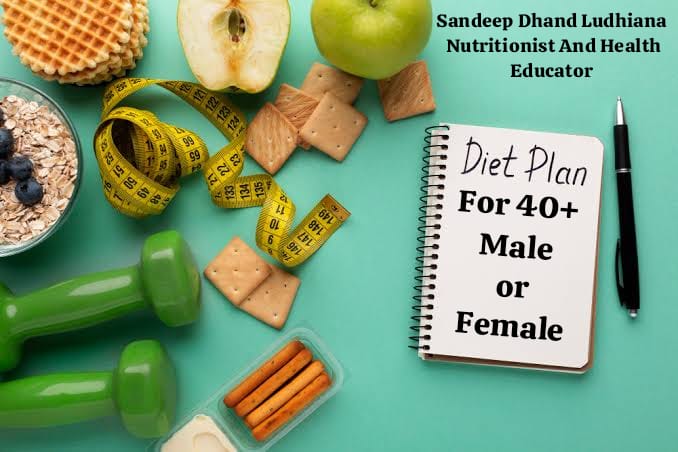Sandeep Dhand Ludhiana
Nutritionist And Health Educator
Maintaining a healthy diet becomes increasingly important as we age, especially for individuals over 40. At this stage, the body undergoes significant changes such as a slower metabolism, reduced muscle mass, and increased susceptibility to health conditions like diabetes, heart disease, and osteoporosis. A well-rounded diet can play a vital role in supporting overall health, boosting energy levels, and preventing chronic diseases.
Why a Healthy Diet Matters After 40

The body’s nutritional needs shift in midlife. While calorie requirements may decrease due to a slower metabolism, the need for essential nutrients like calcium, protein, vitamins, and fiber remains high. Ignoring these needs can lead to deficiencies, reduced immunity, and fatigue. A tailored diet helps in:
Maintaining a healthy weight: A balanced diet prevents unhealthy weight gain.
Preserving muscle mass: Protein-rich foods support muscle health and prevent age-related loss.
Strengthening bones: Calcium and vitamin D are essential to combat bone density loss.
Reducing the risk of chronic diseases: Antioxidants, healthy fats, and fiber lower the risk of heart disease, diabetes, and more.
Components of a Healthy Diet for 40+ Individuals
- Prioritize Protein-Rich Foods
As muscle mass declines with age, protein intake becomes essential. Men and women should aim for lean sources of protein to repair tissues and maintain muscle health.
Sources:
Lean meats (chicken, turkey)
Fish (salmon, mackerel)
Plant-based proteins (lentils, chickpeas, tofu)
Low-fat dairy products
- Focus on Healthy Fats
Not all fats are bad. Healthy fats are crucial for brain function, heart health, and hormone regulation. However, trans fats and excessive saturated fats should be avoided.
Sources:
Avocados
Nuts and seeds (almonds, walnuts, flaxseeds)
Olive oil
Fatty fish (rich in omega-3s)
- Increase Fiber Intake
Fiber aids in digestion, regulates blood sugar, and reduces cholesterol levels. It also helps in feeling full, which can prevent overeating.
Sources:
Whole grains (brown rice, quinoa, oats)
Vegetables (broccoli, carrots, spinach)
Fruits (apples, oranges, berries)
Legumes (beans, peas)
- Boost Calcium and Vitamin D Levels
Bone density decreases with age, especially in women post-menopause. Calcium-rich foods paired with vitamin D are essential for bone health.
Sources:
Dairy (milk, cheese, yogurt)
Leafy greens (kale, spinach)
Fortified foods (cereals, orange juice)
Fatty fish
- Include Antioxidant-Rich Foods
Antioxidants fight free radicals that can accelerate aging and lead to diseases. These nutrients are vital for skin health and reducing inflammation.
Sources:
Berries (blueberries, strawberries)
Dark chocolate (in moderation)
Green tea
Vegetables (bell peppers, tomatoes)
- Hydration is Key
Staying hydrated improves metabolism, supports joint health, and aids digestion. Aim for 8-10 glasses of water daily, and consider herbal teas or infused water for variety.
Specific Diet Tips for Men Over 40
- Heart Health
Heart disease risk increases in men over 40. Focus on foods low in sodium and rich in potassium.
Incorporate nuts, seeds, and bananas for potassium.
Avoid processed foods and opt for home-cooked meals.
- Prostate Health
Tomatoes are rich in lycopene, which supports prostate health. Include them in salads, sauces, or soups.
- Weight Management
Men may accumulate fat around the abdomen. Reduce portion sizes and choose nutrient-dense, low-calorie foods.
Specific Diet Tips for Women Over 40
- Hormonal Balance
Post-40, hormonal changes can lead to weight gain and mood swings. Incorporate phytoestrogens found in soy products to help balance hormones naturally.
- Bone Health
Women are at higher risk of osteoporosis. Calcium-rich foods combined with weight-bearing exercises like walking are essential.
- Metabolism Boost
To counteract a slowing metabolism, opt for smaller, frequent meals and include metabolism-boosting spices like cinnamon and ginger.
Sample Meal Plan for Men and Women Over 40
Breakfast:
A bowl of oatmeal topped with fresh berries and a handful of nuts.
Herbal tea or black coffee without sugar.
Mid-Morning Snack:
A small apple with a tablespoon of almond butter.
Lunch:
Grilled salmon or tofu with quinoa and steamed vegetables (broccoli, carrots, spinach).
A side of leafy green salad dressed with olive oil.
Afternoon Snack:
A handful of mixed nuts or seeds with a cup of green tea.
Dinner:
Grilled chicken or chickpea curry with brown rice.
A side of sautéed kale or spinach.
Evening Snack (Optional):
A cup of yogurt with a sprinkle of flaxseeds.
Lifestyle Tips to Complement Your Diet
- Exercise Regularly: Combine cardio and strength training exercises to maintain muscle mass and improve heart health.
- Get Enough Sleep: Aim for 7-8 hours of quality sleep to support overall well-being.
- Manage Stress: Practice mindfulness, yoga, or meditation to reduce stress levels.
- Avoid Alcohol and Smoking: Limit alcohol intake and avoid smoking to improve long-term health outcomes.
Final Thoughts
A healthy diet for men and women over 40 focuses on nutrient-dense foods, portion control, and balanced meals. By making small, consistent changes, you can improve your energy levels, manage weight, and reduce the risk of age-related health issues. Remember, it’s not just about what you eat but also how you live—combine a wholesome diet with a healthy lifestyle to thrive in your 40s and beyond.
